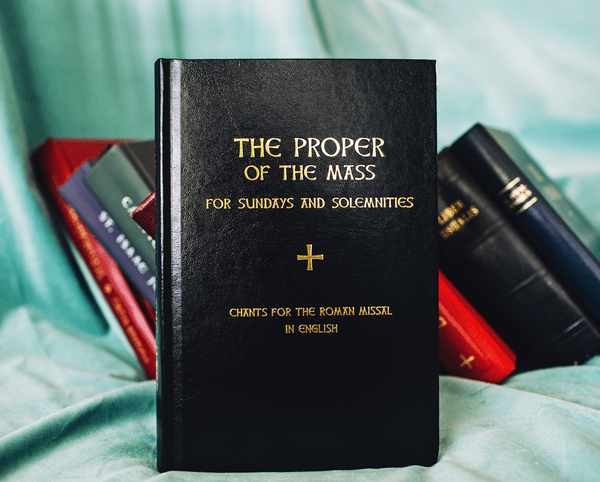
 ERE ARE SOME photos of Fr. Samuel F. Weber’s new book—The Proper of the Mass for Sundays and Solemnities: Chants for the Roman Missal in English—published by Ignatius Press. The book is much thinner than I had anticipated for being 1,292 pages; it’s approximately the size & weight of the Jogues Lectionary. (The super thin pages are not very opaque, I’m afraid.)
ERE ARE SOME photos of Fr. Samuel F. Weber’s new book—The Proper of the Mass for Sundays and Solemnities: Chants for the Roman Missal in English—published by Ignatius Press. The book is much thinner than I had anticipated for being 1,292 pages; it’s approximately the size & weight of the Jogues Lectionary. (The super thin pages are not very opaque, I’m afraid.)
The following link has audio samples & purchase information:
* * “Proper of the Mass” • 1,292 pages
At the moment, I don’t want to say anything negative about such a marvelous production. However, I cannot help observing one thing. Since this collection is meant for singing, Fr. Weber probably should have used the “sung” Propers, which are found in the Graduale Romanum. Fr. Weber tended to favor the “spoken” version. On a practical level, this means that some of the Communion antiphons won’t match the Roman Gradual (revised in 1974). 1
A large percentage of the “sung” and “spoken” propers are identical, and Fr. Weber often used melodies identical to corresponding antiphons in the Graduale. That’s why his occasional preference for the “spoken” version printed in the Missal is perplexing. 2





NOTES FROM THIS ARTICLE:
1 Tons of other collections could be used when the Communion antiphons don’t match: Motyka’s Communions, the SEP, the Lalemant, the official version from the Graduale, and many more.
2 Obviously, since the Roman Missal doesn’t print any Offertory verses, Fr. Weber drew these exclusively from the Graduale. My understanding is that many of the translations are his own.
